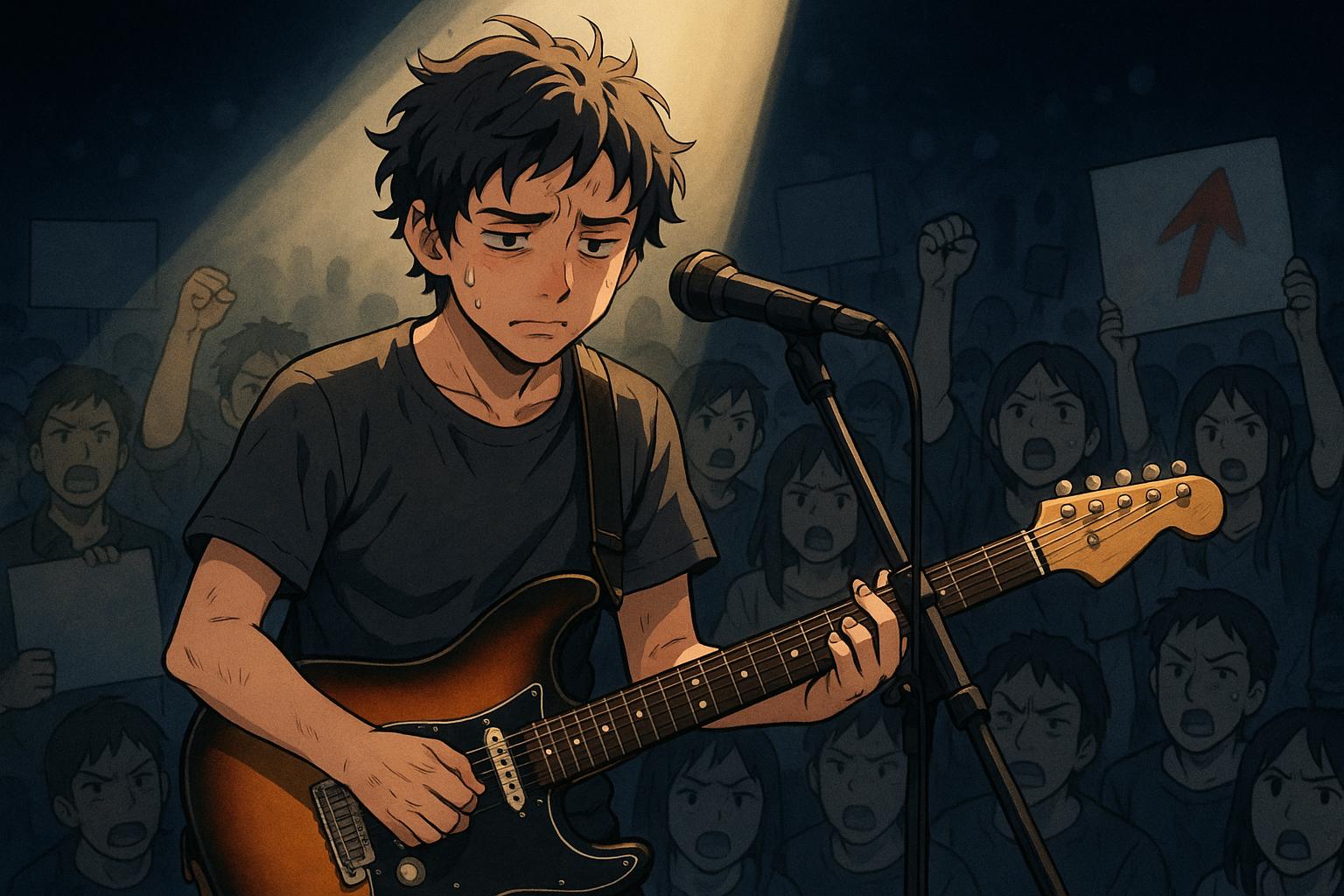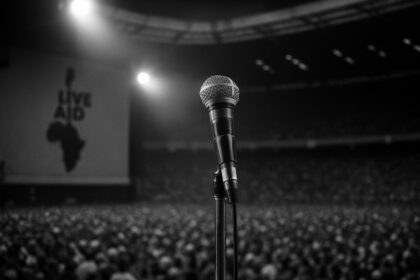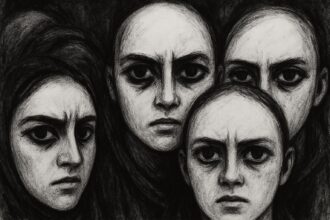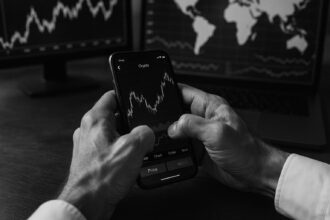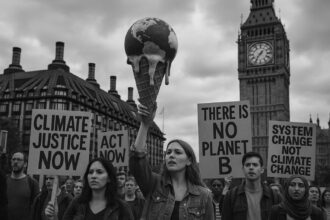Radiohead’s Thom Yorke has revealed the emotional toll on his wellbeing following an altercation with a pro-Palestine heckler at a Melbourne solo show, sparking wider debate on the pressures faced by artists amid global crises.
Thom Yorke, the celebrated frontman of Radiohead, has recently disclosed the profound effects on his mental health following an explosive altercation with a concertgoer during a solo performance in Melbourne. In a poignant Instagram post, Yorke reflected on the interruption that occurred as he began to play “Karma Police,” during which a protester heckled him regarding the ongoing humanitarian crisis in Gaza. The incident has drawn significant attention, highlighting the intersection of art and activism, particularly in the context of the heightened tensions between Israel and Palestine.
Yorke described the moment as he prepared to sing in front of a crowd of 9,000, stating that being confronted with a plea for discussion about the “unfolding humanitarian catastrophe in Gaza” was not the optimal setting. The fiery exchange escalated when Yorke challenged the heckler, inviting him onto the stage to voice his concerns directly. “Don’t stand there like a coward, come here and say it,” he urged. Ultimately frustrated, Yorke left the stage before returning later to complete his encore. This incident not only highlighted his response to public criticism but also ignited discussions about the role of musicians in addressing global crises.
The fallout from this moment has weighed heavily on Yorke, as he expressed regret over his perceived silence on the matter and the subsequent exploitation of that silence by opportunistic groups. He articulated that his intention was to show respect for those affected by the conflict, suggesting that the pressure to comment on such complex issues can become a heavy burden for public figures. Mental health, often overshadowed by the sporting or political discourse surrounding such controversies, emerged as a primary theme in Yorke’s reflections.
Amidst ongoing violence in Gaza, where recent reports indicate that over 54,000 Palestinians have been killed, Yorke’s commentary extended beyond personal struggles. He voiced strong criticism of Israeli Prime Minister Benjamin Netanyahu and called for international pressure on Israel to cease military actions that he views as unjustified. He described the Israeli government’s actions as “totally out of control” and characterised the blockade of aid to Gaza as “horrific.” Yet, Yorke did not shy away from addressing the complexity of the conflict, condemning Hamas for the “truly horrific acts” committed on October 7, which he believes contribute to the suffering experienced by the Palestinian people.
The tragic circumstances surrounding the conflict have sharpened the focus on humanitarian needs, with reports detailing desperate situations faced by civilians. In the days following the Melbourne concert, there were reports of chaos in Gaza as hundreds of Palestinians stormed a United Nations food warehouse in search of sustenance, resulting in casualties amid a fraught atmosphere of urgency and desperation. The dire need for aid has only intensified since an Israeli blockade was reinforced, restricting the flow of essential supplies into the region.
Yorke’s experience at the concert resonates with a growing expectation placed on artists to engage with social and political issues, illustrating how the personal intersects with the public in profound ways. As artists like him navigate these turbulent waters, the implications for their mental health and public perception become increasingly relevant. The challenge remains for figures in the limelight to balance their roles as entertainers and as voices in global conversations, where silence can inadvertently be construed as complicity in a world fraught with injustice.
In reframing his approach to such provocations, Yorke’s introspection may serve as an impetus for others in the creative sphere to consider how they engage with the complexities of our times, thereby shaping not only their messages but their mental well-being as well.
Reference Map:
- Paragraph 1 – [1], [2], [5]
- Paragraph 2 – [1], [3], [4]
- Paragraph 3 – [1], [6]
- Paragraph 4 – [7]
- Paragraph 5 – [1], [4]
- Paragraph 6 – [1], [3], [5]
- Paragraph 7 – [2], [6], [7]
Source: Noah Wire Services
- https://www.dailymail.co.uk/news/article-14765745/Thom-Yorke-mental-health-stage-Palestine-heckling-Israel-Gaza-war.html?ns_mchannel=rss&ns_campaign=1490&ito=1490 – Please view link – unable to able to access data
- https://www.pitchfork.com/news/radiohead-the-smile-thom-yorke-leaves-stage-in-response-to-pro-palestine-protestor/ – Thom Yorke, frontman of Radiohead and The Smile, paused a solo concert in Melbourne after a pro-Palestinian audience member heckled him about the Gaza conflict. The protester shouted about the death toll in Gaza and questioned Yorke’s silence. Yorke confronted the heckler, inviting him on stage to speak his mind. After a brief exchange, Yorke left the stage but returned later to perform ‘Karma Police’. ([pitchfork.com](https://pitchfork.com/news/radiohead-the-smile-thom-yorke-leaves-stage-in-response-to-pro-palestine-protestor/?utm_source=openai))
- https://www.musicradar.com/artists/shows-festivals/you-want-to-p-s-on-everybodys-night-come-on-ok-you-do-see-you-later-then-thom-yorke-leaves-stage-after-pro-gaza-protester-interrupts-show – During a solo performance in Melbourne, Thom Yorke was interrupted by a pro-Palestinian protester while playing ‘Karma Police’. The protester criticized Yorke for his silence on the Gaza conflict. Yorke responded by challenging the heckler to come on stage and voice his concerns directly. After a brief exchange, Yorke left the stage but returned to complete the encore. ([musicradar.com](https://www.musicradar.com/artists/shows-festivals/you-want-to-p-s-on-everybodys-night-come-on-ok-you-do-see-you-later-then-thom-yorke-leaves-stage-after-pro-gaza-protester-interrupts-show?utm_source=openai))
- https://www.theguardian.com/music/2024/oct/31/thom-yorke-walks-off-stage-after-being-heckled-by-pro-palestine-heckler-at-melbourne-concert – Thom Yorke walked off stage during a solo show in Melbourne after a pro-Palestinian protester heckled him about the Gaza conflict. The protester shouted about the ‘Israeli genocide of Gaza’ and questioned Yorke’s silence. Yorke confronted the heckler, inviting him on stage to speak his mind. After a brief exchange, Yorke left the stage but returned later to perform ‘Karma Police’. ([theguardian.com](https://www.theguardian.com/music/2024/oct/31/thom-yorke-walks-off-stage-after-being-heckled-by-pro-palestine-heckler-at-melbourne-concert?utm_source=openai))
- https://www.bbc.co.uk/news/articles/c5yrv2zyd22o – Thom Yorke briefly walked off stage during his Australian solo tour after an exchange with an audience member who heckled him with a protest about deaths in Gaza. Videos posted online by concert-goers at the Melbourne show on Wednesday show a man in the crowd shouting at Yorke. While not all of his words can be heard, he calls on the singer to ‘condemn the Israeli genocide of Gaza’. Yorke responds by telling the heckler to ‘hop up on stage’ to make his remarks. ‘Don’t stand there like a coward, come here and say it. You want to piss on everybody’s night? Ok you do it, see you later,’ Yorke continues, before removing his guitar and halting his set. His exit came as the heckler had repeated his call and added ‘how many dead children will it take’. Segments of the crowd could be heard booing the disturbance, and Yorke returned to cheers shortly after to play the Radiohead song Karma Police. ([bbc.co.uk](https://www.bbc.co.uk/news/articles/c5yrv2zyd22o?utm_source=openai))
- https://www.stereogum.com/2285932/thom-yorke-storms-offstage-after-responding-to-anti-israel-protester/news/ – Thom Yorke confronted a pro-Palestinian protester during a solo show in Melbourne. The protester criticized Yorke for his silence on the Gaza conflict. Yorke responded by challenging the heckler to come on stage and voice his concerns directly. After a brief exchange, Yorke left the stage but returned to perform the encore. ([stereogum.com](https://www.stereogum.com/2285932/thom-yorke-storms-offstage-after-responding-to-anti-israel-protester/news/?utm_source=openai))
- https://edition.cnn.com/2024/10/31/entertainment/thom-yorke-radiohead-melbourne-heckled-intl-scli/index.html – Radiohead singer Thom Yorke took off his guitar and left the stage during his solo concert in Melbourne, Australia, on Wednesday after being heckled by a pro-Palestinian protester. In video footage circulating on social media, a concert-goer can be heard shouting toward the stage at the Sidney Myer Music Bowl about the rising death toll in Gaza and ‘the Israeli genocide of Gaza.’ The protester asks Yorke, ‘How could you be silent’ in the face of the conflict. Yorke replies by saying, ‘Come up here and say that. Right here. Come on. Come up on the f**king stage and say what you want to say.’ Pointing at the heckler, he continued: ‘Don’t stand there like a coward. Come here and say it.’ ‘Come on. You want to piss on everybody’s night? Come on,’ Yorke adds, before saying, ‘OK, you do. See you later then.’ Yorke then left the stage, before later returning to perform Radiohead’s 1997 hit ‘Karma Police,’ according to social media posts. ([edition.cnn.com](https://edition.cnn.com/2024/10/31/entertainment/thom-yorke-radiohead-melbourne-heckled-intl-scli/index.html?utm_source=openai))


